
The Macariini are a tribe of geometer moths in the subfamily Ennominae. Though they share many traits with the Sterrhinae, this is probably plesiomorphic rather than indicative of a close relationship, and DNA sequence data points to the Boarmiini as particularly close relatives of the Macariini. All things considered, this tribe might still resemble the first Ennominae more than any other living lineage in the subfamily.
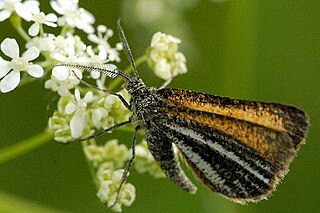
Isturgia limbaria, the frosted yellow, is a moth of the family Geometridae.

Isturgia penthearia, the penthearia moth, is a moth of the family Geometridae. It is found in Australia.
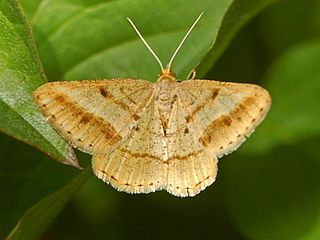
Isturgia is a genus of moths in the family Geometridae described by Jacob Hübner in 1823.
Louis Beethoven Prout (1864–1943) was an English entomologist and musicologist.

Isturgia famula is a moth of the family Geometridae. It is known from southern Europe.
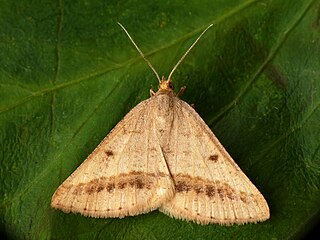
Isturgia arenacearia, the sand bordered bloom, is a moth of the family Geometridae. It was first described by Michael Denis and Ignaz Schiffermüller in 1775.
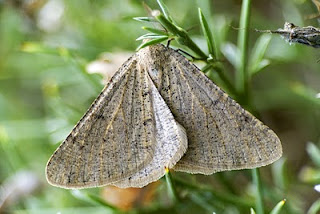
Isturgia miniosaria is a species of moth in the family Geometridae. It is found in France, Spain and Portugal. It is also found in North Africa, including Morocco.
Haplolabida lacrimans is a species of moth of the family Geometridae first described by Claude Herbulot in 1970. It is found in northern Madagascar.
Haplolabida viette is a species of moth of the family Geometridae first described by Claude Herbulot in 1970. It is found in northern Madagascar.
Chrysocraspeda angulosa is a species of moth of the family Geometridae first described by Claude Herbulot in 1970. It is found in northern Madagascar.
Isturgia contexta is a moth of the family Geometridae. It is found in Madagascar and Comoros.
Milocera horaria is a species of moth of the family Geometridae first described by Charles Swinhoe in 1904. It is found on Madagascar.
Chrysocraspeda nasuta is a species of moth of the family Geometridae. It is found in Madagascar.
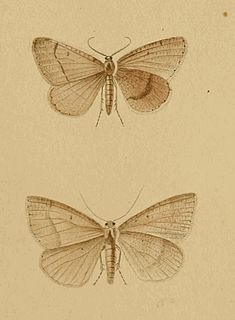
Isturgia spodiaria is a moth of the family Geometridae. It was described by A. Lefèvre in 1832. It is found in Spain, Malta and North Africa.

Isturgia catalaunaria is a moth of the family Geometridae first described by Achille Guenée in 1858.

Isturgia disputaria, the Maltese bloom, is a moth of the family Geometridae. It was described by Achille Guenée in 1858. It is found on the Canary Islands and Malta and in the Afrotropical realm, Asian Turkey, the Caucasus, Georgia, Armenia, Azerbaijan, Lebanon, Syria, Israel, Jordan, Egypt, the Arabian Peninsula, Iran and Iraq.
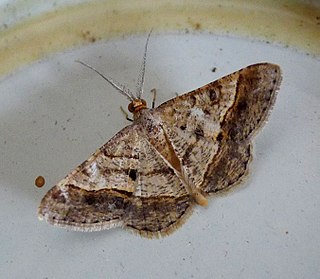
Isturgia pulinda is a moth of the family Geometridae first described by Francis Walker in 1860. The species has a widespread distribution from the African countries of Botswana, Ethiopia, the Gambia, Kenya, Malawi, Mozambique, South Africa, Tanzania, Zambia and Zimbabwe to Saudi Arabia and Yemen towards the Indian subregion and Sri Lanka. In Europe, it is found in the Canary Islands, Spain, Portugal and the Cape Verde Islands.
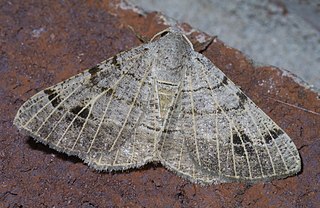
Isturgia dislocaria, the pale-veined isturgia moth, is a species of geometrid moth in the family Geometridae. It first described by Alpheus Spring Packard in 1876 and it is found in North America.










